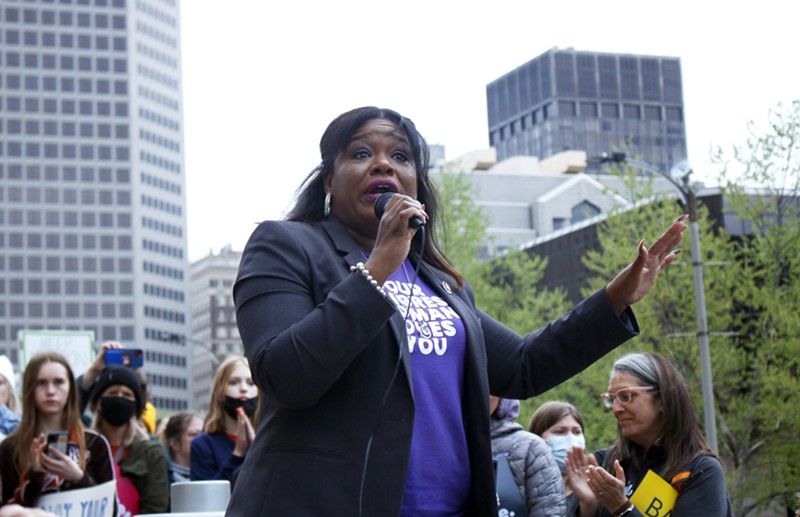The Way to Save Roe? Abolish the Filibuster, Says Cori Bush
It’s been a tough couple of days for U.S. Representative Cori Bush (D-Mo.).
When news leaked of the Supreme Court’s draft decision to overturn Roe v. Wade and Planned Parenthood v. Casey the Democratic congresswoman says she didn’t believe it at first.
“I was broken,” Bush said Wednesday at a news conference with reporters.
The same sentiment has passed through the minds of several Missourians in recent days as the Supreme Court seems set to abolish Americans’ federal right to abortion. Due to Missouri's “trigger law,” Missourians would have little access to abortion once the Supreme Court’s decision takes effect, with no exceptions for rape or incest.
Bush says she sees one path forward — abolishing the filibuster.
“Our position has been the same since I’ve been in this seat, and it has been to abolish the filibuster,” she adds. “We need the votes, and right now, we do not have the votes to codify Roe v. Wade.”
The filibuster allows a minority of senators, 41, to block the action of the majority. When it is used, 60 votes are required for legislation to pass. This supermajority makes it nearly impossible for Democrats to garner enough support in the county’s sharply divided Senate to codify Roe v. Wade. Doing so would establish the landmark abortion- rights decision as law.
According to Anita Manion, assistant professor of political science at the University of Missouri–St. Louis, abolishing the filibuster is a near impossibility at this point.
“As much as I would like to say there’s a possibility, there isn’t,” Manion says.
Abolishing the filibuster would take a majority vote of the Senate, so at least 51 votes. This would require all 50 democrats plus Vice President Kamala Harris to vote against it. But that won’t happen as Democratic senators Joe Manchin and Kyrsten Sinema have both stated they won’t vote to abolish the filibuster.
Manchin argues that the filibuster protects democracy. Sinema says that there have been seven times when the 60-vote threshold in the Senate protected abortion rights.
Bush says she’d like to see President Joe Biden pressure senators to change their stance.
“I would love to see the president use some of his political capital in this way,” Bush says. “Because, once it’s done, it’s done. We’re talking about something that has been our constitutional right for 49 years. And this is something that can be rolled back so simply?”
But it’s not all doom and gloom. One optimistic path forward, according to Manion, is the wide outrage the Supreme Court’s opinion could spark and its potential to motivate voters.
“Some of the language used in this decision has the potential to undermine other rights,” Manion says. Roe established that a person's right to privacy protects a pregnant person's right to choose whether or not to have an abortion. The right to privacy was used to overturn sodomy laws and establish the right to contraception. “It could inspire a lot of people to be motivated politically, not just pro-choice advocates.”
Though her party doesn’t have enough votes to overturn this seismic opinion if it takes effect, Bush doesn’t like to hear things are impossible.
At the news conference, Bush recalled how she was told extending the eviction moratorium was impossible, yet it was extended.
“When they tell me it’s impossible, that just means to me to work harder,” Bush says.
Updated 5/5/2022 11:47 p.m. to clarify why some Democrats don't wish to abolish the filibuster.


